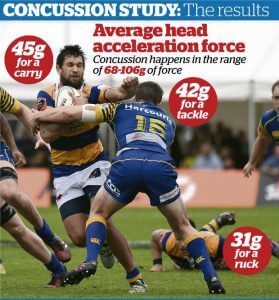Physionews: New study finds stronger necks: few concussions. Copied-National-New Zealand Herald News
A ground-breaking New Zealand study has found players with weaker and uneven neck strength are more vulnerable to severe impacts that may cause a concussion. Rugby coaches are being urged to concentrate on improving players’ neck strength in a bid to avoid debilitating concussions.
Experiment
The experiment by Otago University’s Dr. Hamish Osborne and Research Fellow Dr. Danielle Salmon used Bluetooth sensors behind the ears of 23 players in the Otago Mitre 10 Cup rugby team to measure acceleration, or g-forces, during impacts in five games.
The neck strength of each player was also measured using the specially designed equipment.

Salmon said the weaker the neck the more severe the damaging “whiplash” type movement. A higher acceleration force was also recorded.
“We found players with stronger necks had lower acceleration or whip-lash like movement.
“The stronger you can make the neck the less the head accelerates – it controls the brain’s movement against the skull.”
Salmon said coaches at all levels needed to put as much value on neck strengthening exercises as they did fitness and skills.
The study revealed props sustained the most frequent and strongest head accelerations force, while those on the wing had the fewest hits but those they did receive were often powerful.
The data showed the players on average sustained 48 impacts per game.
“When we break down the game to specific events, we observed that the average head acceleration force for a carry was 45g. For a tackle it was 42g and for a ruck, 31g.”
Research in the United States suggested concussion happens in the range of 68 – 106 g of force.
Humans are able to bear localized g-forces in the hundreds of g’s for a split second, such as a slap on the face. But continued g-forces above about 10g can lead to permanent injury.
http://m.nzherald.co.nz/nz/news/article.cfm?c_id=1&objectid=11824897